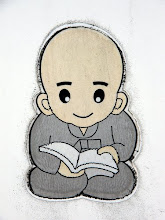- Fearing that his past karma is heavy and his period of cultivation short, and that therefore, he may not be reborn in the Pure Land;
- Fearing that he has not yet fulfilled his vows nor eliminated greed, anger and delusion, and that therfore, he may not be reborn in the Pure Land;
- Fearing that even though he has recited the Buddha's name, Buddha Amitabha may not come, and that therefore, he may not be reborn in the Pure Land. (Thich Thien Tam, Buddhism of Wisdom and Faith, sect.68.)
Tuesday, December 2, 2008
Three Points of Doubt at the Time of Death
The key words here are "utmost faith". According to a well-known Elder Master, Tzu Chao, the Pure Land practitioner faces three points of doubt at the time of death:
Meditation Sutra, Sixteenth Meditation
The two operative phrases here are "on the verge of death" and "utmost sincerity and devotion". When a wicked person, on his deathbed, senses evil omens arising from his subconscious and he sees no possible alternative, a mind of utter sincerity and devotion is sometimes possible. Such a frame of mind is pratically impossible to develop in the course of everyday life. The following is a good illustration.
There was once a Zen monk meditating on a deserted mountain far away from all human habitation. Because of the rigors of the climate and the isolation of the place, he found it difficult to concentrate. His mind constantly wandered toward life in the village down below. One evening, as he was seated lost in errant thought, he had the sensation that he was being watched. He slowly turned his head, and lo and behold, there was a tiger crouched in the bushes behind him! One false move and the tiger would pounce on him. He had no choice but to remain ramrod straight, in singleminded concentration. When dawn broke, the tiger, fearful of the light of day, gave up this cat-and-mouse game and disappeared. The next two evenings, the monk, faithful to his vow, resumed his meditation at the appointed time and place. The tiger returned and the scene repeated itself each evening. When daylight came on the third day, the monk, after three nights of singleminded concentration, experienced a Great Awakening, collapsed and died. At his funeral, it was reported that a tiger was seen watching and wailing in the distance.
There was once a Zen monk meditating on a deserted mountain far away from all human habitation. Because of the rigors of the climate and the isolation of the place, he found it difficult to concentrate. His mind constantly wandered toward life in the village down below. One evening, as he was seated lost in errant thought, he had the sensation that he was being watched. He slowly turned his head, and lo and behold, there was a tiger crouched in the bushes behind him! One false move and the tiger would pounce on him. He had no choice but to remain ramrod straight, in singleminded concentration. When dawn broke, the tiger, fearful of the light of day, gave up this cat-and-mouse game and disappeared. The next two evenings, the monk, faithful to his vow, resumed his meditation at the appointed time and place. The tiger returned and the scene repeated itself each evening. When daylight came on the third day, the monk, after three nights of singleminded concentration, experienced a Great Awakening, collapsed and died. At his funeral, it was reported that a tiger was seen watching and wailing in the distance.

Subscribe to:
Comments (Atom)
